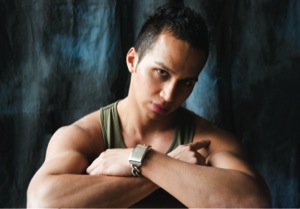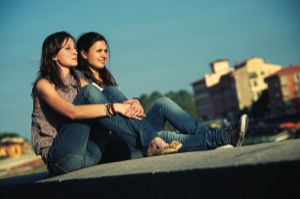
A traditional Latino upbringing can be a challenge for someone struggling with their sexual orientation or gender identity. Tradition, culture and religion play a huge role in the shaping of a young Latino or Latina’s life. My family was no different. I was born in New York City to Puerto Rican parents, and raised in Orlando, Fla. Florida is not known for being a bastion of tolerance to the LGBT community and was not exactly a safe place to come out. To be honest I was lucky, it turned out my mother was an unconditionally supportive person in my life but there was no way to be sure of that before she found out. I hid my orientation like the rest and struggled with it throughout my high school years.
The military played a huge role in my childhood. My parents had separated when I was very young and my mother was concerned that I lacked the structure that a male parent may have provided. That isn’t to say my mother wasn’t strong or structured, she had a long career in law enforcement and was a strong and independent Latina woman. Nevertheless, she enrolled me in my school’s Air Force Junior Reserve Officer Training Corps. I think this was a very subtle attempt to correct my aversion to sports and more masculine activities and I think even then I had displayed signs that I was different.
I hated JROTC, but I excelled in it and soon rose to the highest rank of command. I was the deputy wing commander of more than 360 cadets and commanded the school’s award winning rifle team. It had seemed that my mother’s experiment had worked because I gravitated toward the idea of entering the military. As I struggled with my orientation I kept it to myself, I knew early on that I would have to hide that part of my life in order to serve, and that was my calling.
Religion solidified my silence; my father’s side of the family were devout Catholics, and while my mother wasn’t as devout as her parents she enrolled me in a private Christian school during middle school. I was one of many Latino students, and it was there that I must have formulated the idea that I could hide and defeat my sexual orientation. I had figured in my all-knowing teenager years that if priests could be celibate in their service to God, then surely I could do the same in my service to my country. I embraced my culture, and religion and I stood silent throughout most of my high school years.
In 2004 the struggles of the LGBT community, although then I likely just called it the gay community, were presented to me via the media. It was then that the newly-elected mayor of a city, that to me might as well have been a distant land, Gavin Newsom, defied a nation and state and allowed people of the same sex to be married in San Francisco. This led to an attorney in Broward County suing for the right of 170 gay and lesbian couples who sought to be married. These milestones opened a chapter in my life that I had thought to close. I began to seek others like me.
My mother took notice, and confronted me. One day while returning from school, my mom produced a bag of notes between me and a boy that I had met and begun a relationship with. Angry that she would invade my privacy I defiantly told her that I was “bi” and stormed out. Even then I couldn’t come out all the way. I figured being bi would be a little less of a shock, but it was never true.
My mother shocked me and tearfully embraced me upon my return.
“I love you, and I am not mad that you are this way.” She said. “I am just hurt that you did not tell me you were struggling with this sooner.”
With that I was relieved. I joined the military and I went on with my life. What happened later is another story but the important thing was that in my Latino family, I was accepted, and I didn’t have the experience that many had. I was lucky.
For Lucía, a 21-year-old San Diego State University student who identifies as “bi,” the journey to openness about her sexual orientation had obstacles, but has seen improvement. Lucia had grown up in a small town, and had a very traditional Catholic upbringing.
She had a very similar experience to mine. Her mother had found a letter between her and her ex-girlfriend which had various details about their relationship. She did not come out willingly.
“When they found out,” she said. “My parents being traditional Mexican Catholics, didn’t take the news well and my mom sent me to a therapist to ‘help me’ with my sexuality.”
The therapy proved oppressive. On the advice of the therapist, the thirteen year old Lucía was taken to the mall to be outfitted with “girl” clothes and her parents were advised to keep a close watch over her, monitoring all aspects of her life. Religion played a large role in the therapist’s approach, but proved unsuccessful.
“My mother would confront me every other month or so and ask me if my sexuality had changed.” Lucia told San Diego LGBT Weekly. “Eventually I stopped going because my parents thought her suggestions were too extreme.”

For five years her parents strongly disapproved of her lifestyle and sexual orientation. That disapproval had lasting effects on Lucía’s life and self esteem.
“It was rough,” she said. “And to this day I still sometimes feel that there is something wrong with me because my sexuality isn’t straight.”
Lucía now lives with her girlfriend of one year and has seen some improvement in her parents’ treatment of her and her sexuality.
“They are supportive to a limit,” she said. “But in the end I know they still hope that I will end up with a man.” v
For one transgender individual the story was much more painful. Preferring to be called “Lindsey” for fear of retaliation from her family, I found out her path was wrought with pain and abandonment.
Lindsey, who grew up in New York City, was disowned by her family. She was 16 and cast out into the streets of New York.
“They basically said you are dead to us,” she said. “They quoted the Bible and called me an abomination. I mean this was my own father.”
Lindsey had to learn early on how to fend for herself. She had tried to contact different family members but she was turned away every time. Her predicament worsened and she turned to prostitution to get by or what some experts call “survival sex.”
“I can’t begin to explain how humiliating it was for me.” A tearful Lindsey told LGBT Weekly.
Eventually she was taken in by a gay cousin who himself struggled with coming out in the same traditional family.
“Quique saved me,” she said. “We don’t have much but at least I have a home and someone who cares.”
Each of these stories ended on a somewhat positive note, but many go untold, some even tragic. To be Latino and LGBT mean culture and religion often play huge roles in your life. Sometimes they are obstacles, even the means to oppress and hurt. It was important for Lindsey to express her hope.
“I just hope that people don’t get scared by my story too much,” she said. “I hope that people will notice that at least for me things got better, and I am hopeful. Yo soy boriqua. That is in my blood and no one is going to take that from me. So if anyone learns anything I hope they learn this: don’t give up.”
In Lindsey’s interview she talked about “mi orgullo.” Orgullo means pride and that too is a shared theme. In spite of the obstacles, each of us still have our pride, pride in our heritage, and pride in ourselves. v











